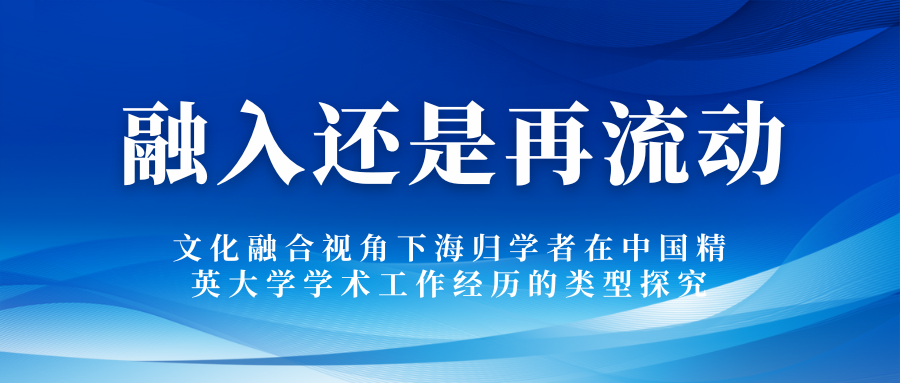作者:陈佳欣 杜晓馨 发布时间:2023-12-27 16:37:24 来源:复旦发展研究院+收藏本文

Integration or Re-mobility: Exploring the Typologyof Academic Returnees'Post-return Experiences inChinese Universities from the Cultural AssimilationPerspective

发表期刊 | Beijing International Review of Education
《Beijing International Review of Education》是一本2019年初创的国际季刊,主要关注教育理论、历史、哲学及相关实证科学,以英文发表各类文章,特别关注教育对社会、文化和经济的贡献。本期刊中的所有文章均经过严格的同行评审。
DOI:https://doi.org/10.1163/25902539-bja10022
作者
陈佳欣 香港理工大学应用社会科学系助理教授,研究方向为教育社会学及移民研究。
*杜晓馨(通讯作者)复旦大学复旦发展研究院助理研究员,研究方向为高等教育中的公民教育及青年研究。
摘要
本世纪以来,获得海外高校博士学位的中国学者中选择回国从事学术工作的群体增多。虽然这种趋势有利于扭转近年来中国面对的人才流失的局面,但许多研究也发现,这些海归学者在回国入职后可能会面临很难融入中国高校学术文化的困境。本研究从文化融合理论的视角出发,分析了这些任教于中国精英高校的海归学者在回国职业发展初期的学术文化融入过程,并探讨了其融入过程的复杂性。共有29名来自上海和广州两地的八所精英高校的海归学者参加了半结构化访谈。本研究发现,海归学者在学术文化融入上面临的困境主要体现在两个方面:衡量研究成果时评价标准的不匹配与构建可以信赖的本地学术共同体时的阻碍。此外,我们还根据海归学者对这两方面的困境所做出的反应及他们给出的内在原因对他们进行分类。我们认为,海归学者在归国后其学术文化融入的过程可大致分为三种模式:融合、游离和自我隔离。本研究提出,促进海归学者与本土学术界之间的相互理解对促进前者实现文化融合至关重要。尤其当国际学术界与本土学术界在占主导位置的科研评价方式和学术工作规范上可能存在不一致的情况下,我们认为,这种相互理解更加需要制度化的措施来实现。
Abstract
In this century, Chinese overseas-educated academics have been attracted to return to their homeland to reverse the brain drain trend in China. However, many studies have found that these academic returnees may face difficulty reintegrating upon returning. This study examines the complexity of academic returnees’ post-return integration process in Chinese universities via the cultural assimilation theory perspective. Twenty-nine in-depth semi-structured interviews with academic returnees from eight top universities in Shanghai and Guangzhou were conducted. In our analysis, academic returnees perceived two obstacles to their cultural integration after returning: the mismatch in valuing research outputs and the barriers to forming a trustworthy local research community. According to their reactions to perceived challenges and given rationales, we categorized returnees’ post-return integration processes into three patterns: integration, enclavement, and self-separation. We suggest that institutionalized practices to cultivate mutual understandings between returnees and local academia regarding overseas-developed academic culture and its distinction with dominant values and norms in the local academic community are imperative to facilitate academic returnees’ post-return integration.
Keywords
academic returnees;integration;academic mobility;cultural assimilation;higher education;China
更多信息,请参考:https://brill.com/view/journals/bire/5/4/article-p405_003.xml